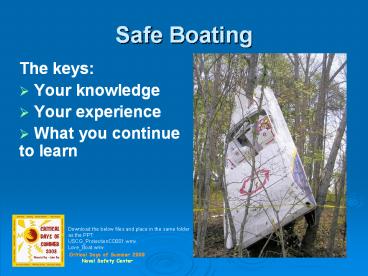Safe Boating - PowerPoint PPT Presentation
1 / 13
Title:
Safe Boating
Description:
Safe Boating The keys: Your knowledge Your experience What you continue to learn Download the below files and place in the same folder as the PPT: USCG ... – PowerPoint PPT presentation
Number of Views:140
Avg rating:3.0/5.0
Title: Safe Boating
1
Safe Boating
- The keys
- Your knowledge
- Your experience
- What you continue to learn
Download the below files and place in the same
folder as the PPT USCG_ProtectionCD001.wmv Love_B
oat.wmv
2
The Down Side
- In 2006, 3,474 people were reported injured and
710 died in boating incidents. - 90 of the people who drowned werent wearing
life jackets. - Alcohol involvement was a contributing factor in
about 20 of all reported boating deaths.
3
First, Get There
- Remember, as a beginner, never go boating on
your own. Once you have decided what you want to
do with your boat and how you want to use it,
talk to others who can help you to choose the
best boat for your boating purpose.
- Then begin by practicing your new boating skills
in calm, protected waters before trying more
difficult waters.
4
Rules of the Road
- Once on the water, keep a good lookout for others
on, in and under the water. - Know the speed limits that apply to your craft at
which you can manage safely on the water. - Most important of all know the Rules of the Road
at Sea. These rules are designed to help you
decide immediately what action to take. When
something goes wrong you must act quickly,
positively and correctly. Then you will continue
to keep everyone safe and have fun in boats.
5
Rules of the Road, cont.
- Follow these rules and you will be nautical miles
ahead in personal fun and safety. - Know your boat - what it can and cant do.
- Dont overload - check the boat manufacturers
capacity plate. - Keep a good lookout and situational awareness of
other boats and objects. - Take due care coming aboard and going ashore.
Double click in box to show video
Double click to advance presentation
6
Rules of the Road, cont.
- Take sufficient fuel - in proper containers -
know your cruising radius. - Keep your boat shipshape, check safety
equipment. - Take necessary equipment fire extinguishers,
personal flotation devices, fuel, etc. - Secure the boat properly stow loose objects.
- Learn boating laws and obey them.
- Never operate a boat while intoxicated.
- Operate at safe and legal speeds - watch your
wake. - Know and respect the weather - heed weather
warnings.
7
Rules of the Road, cont.
- Get a list of recommended safety equipment from
the Coast Guard and make sure all items are on
board and in working condition. You and all you
passengers should have a Personal Flotation
Device (PFD) that fits properly. - Leave your itinerary with someone. Tell them who
you will be with, how long you will be gone, and
where you plan to go. - Know the rules and regulations of the area you
will be navigating.
8
Rules of the Road, cont.
- Fill tanks 90-92 percent full to allow for
expansion. Close hatches and opening before
fueling. Turn off electrical heat and appliances.
NO SMOKING while fueling. - Capsizing occurs on small boats because of
sudden weight shifts. Move carefully. - Give swimmers, skiers and divers plenty of
distance. - Stay alert, keep your eyes open and empty many
of the same defensive measures you use behind the
wheel of a car.
9
Impairment
- According to a National Transportation Safety
Board (NTSB) study, it takes - only a third as much alcohol to
- impair a boater's balance,
- judgment and coordination in
- comparison to drivers of vehicles
- on land.
- Having two beers on the water
- can impair your abilities as much
- as drinking a six-pack at a
- backyard barbecue.
10
Boaters Hypnosis
- Research has shown that as little as four hours'
exposure to sun, wind, glare, vibration, and
other motion on the water produces "boater's
hypnosis," a kind of fatigue that slows reaction
time almost as much as if a person were drunk.
11
Alcohol
- Alcohol can affect judgment, motor skills,
peripheral vision, depth perception, night
vision, and balance. A "tipsy" person on an
unstable, moving platform like a boat runs the
risk of slipping on deck, stumbling down a
gangway, lurching and shifting suddenly in the
boat, pushing people overboard, or falling - overboard themselves. In the event of
- a fall overboard, alcohol may increase
- risk of cardiac arrest and will certainly
- reduce the body's ability to stay warm
- in cold water.
12
Get Smarter
- Before you take your boat out of dry dock,
remember that safe boating starts before you
first set out on the water. Do not wait until a
crash to educate yourself and your passengers on
the rules of safe boating. Alcohol use isn't the
sport. Boating is the sport and should be enjoyed
safely.
Double chick on black box to show video
Double click to advance presentation
13
Plan Ahead Manage Risks
Click to advance PPT































